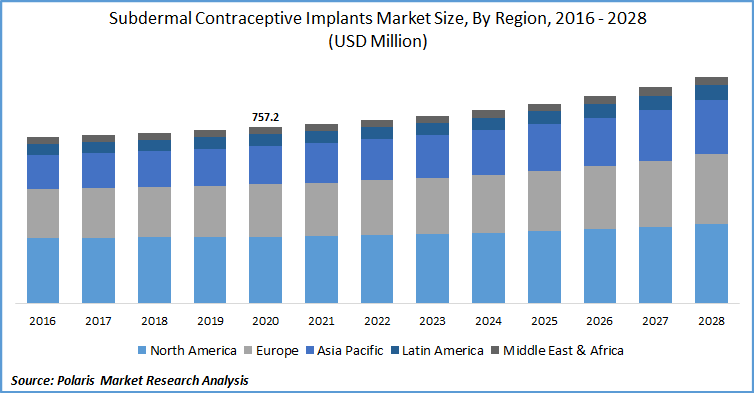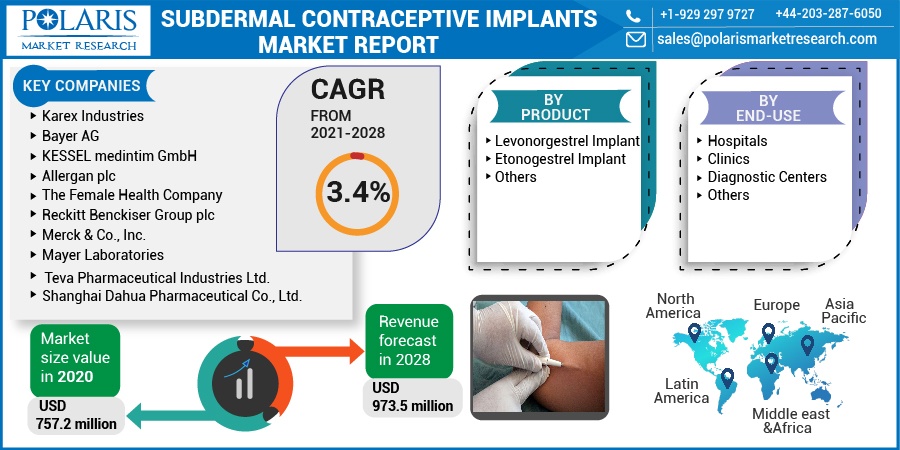
Subdermal Contraceptive Implants Market Share, Size, Trends, Industry Analysis Report, By Product (Levonorgestrel Implant, Etonogestrel Implant, Others); By End-Use (Hospitals, Clinics, Diagnostic Centers, Others); By Regions; Segment Forecast, 2021 - 2028
- Published Date:Apr-2021
- Pages: 101
- Format: PDF
- Report ID: PM1844
- Base Year: 2020
- Historical Data: 2016-2019
Report Summary
The global subdermal contraceptive implants market size was valued at USD 757.2 million in 2020 and is expected to grow at a CAGR of 3.4% during the forecast period. Contraceptive implants are hormonal birth control, which is inserted in the upper arm. The implant is responsible for releasing hormones in the body for the prevention of pregnancy.
 Know more about this report: Request for sample pages
Know more about this report: Request for sample pages
The subdermal contraceptive implants are easy to use and offer high effectiveness. Subdermal contraceptive implants provide birth control for around three years, following which fertility is returned upon removal of the implant. The increasing number of abortions, growing demand for long-term birth control methods, and growing investments in the healthcare sector are some factors expected to fuel the demand for subdermal contraceptive implants during the forecast period.
Technological advancements and significant investments in research and development support market growth. New product launches and acquisitions by leading players in the market have increased the demand for subdermal contraceptive implants across the globe. In February 2018, DKT International collaborated with Shanghai Dahua Pharmaceutical Co., Ltd. for the marketing of Levoplant, which is a contraceptive implant.
The collaboration is aimed at improving the accessibility, availability, and affordability of Levoplant. Shanghai Dahua Pharmaceutical Co., Ltd. aims at strengthening its manufacturing of Levoplant through the partnership, whereas DKT plans to launch Levoplant into new markets, along with marketing, and servicing customers.
Industry Dynamics
Growth Drivers
The market demand for subdermal contraceptive implants has increased owing to their high effectiveness, and affordability. Increasing preference for these implants among women has resulted from their increased safety, and efficacy for three years without intervention. These implants can be easily removed for a quick return to fertility. The contraceptive operates through modification of the endometrium, suppression of ovulation, and increased viscosity of the cervical mucus.
The global market for subdermal contraceptive implants is fueled by increasing demand from countries such as China, Japan, and India, a growing population, and rising healthcare expenditure. Rising health concerns, improving healthcare infrastructure, and growing awareness regarding preventive healthcare have further increased the demand for these implants.
The global market for subdermal contraceptive implants is influenced by increasing awareness regarding contraceptives, growing concerns regarding sexual health, and growing initiatives by governments for population control. Growing disposable income, changing lifestyles, and the introduction of affordable contraceptives by market players would support the growth of the market.
A growing number of unwanted pregnancies and abortions and technological advancements boost the adoption of subdermal contraceptive implants. Global players are expanding into developing countries to tap potential, further boosting the market growth for subdermal contraceptive implants.
 Know more about this report: Request for sample pages
Know more about this report: Request for sample pages
Subdermal Contraceptive Implants Market Report Scope
The market is primarily segmented on the basis of product, end-use, and region.
|
By Product |
By End-Use |
By Region |
|
|
|
Know more about this report: request for sample pages
Product Outlook
The market for subdermal contraceptive implants is segmented into levonorgestrel implant, etonogestrel implant, and others, based on product. The etonogestrel subdermal contraceptive implants segment dominated the global subdermal contraceptive implants market in 2020.
Etonogestrel implants are small, flexible, and are placed under the skin of the upper arm. It is a long-acting birth control option solution, providing continuous contraception for up to 3 years. The increasing population, changing lifestyles, and growing awareness associated with contraception have increased the demand for etonogestrel implants.
End-Use Outlook
The end-use subdermal contraceptive implants industry segment has been divided into hospitals, clinics, diagnostic centers, and others. The hospital segment dominated the global subdermal contraceptive implants market in 2019. The high traffic environment, advanced healthcare infrastructure, availability of advanced medical equipment and services, and presence of experienced medical professionals in hospitals support the growth of this segment.
Geographic Overview
North America dominated the global market for subdermal contraceptive implants in 2020. Established healthcare infrastructure, growing research and development activities, and technological advancements are some factors attributed to the growth of this region. There has been an increasing number of abortions registered in the region, driving the market growth.
Rising health concerns, a growing number of unwanted pregnancies, increasing awareness regarding efficient contraceptive and introduction of affordable implants has increased the demand in the region. High disposable income, increasing government initiatives, and the introduction of supportive healthcare programs further supplement the market growth for subdermal contraceptives.
Competitive Landscape
The leading market players in the subdermal contraceptives industry include Karex Industries, Bayer AG, Teva Pharmaceutical Industries Ltd., KESSEL medintim GmbH, Allergan plc, Shanghai Dahua Pharmaceutical Co., Ltd., The Female Health Company, Reckitt Benckiser Group plc, Merck & Co., Inc., and Mayer Laboratories. These players are expanding their presence across various geographies and entering new markets in developing regions to expand their customer base and strengthen presence in the market.
License and Pricing
Purchase Report Sections
- Regional analysis
- Segmentation analysis
- Industry outlook
- Competitive landscape
Connect with experts
Suggested Report
- Treatment Planning Systems and Advanced Image Processing Market Share, Size, Trends, Industry Analysis Report, 2021 - 2028
- Thermal Barrier Coatings Market Share, Size, Trends, Industry Analysis Report, 2022 - 2030
- Thermal Scanners Market Share, Size, Trends, Industry Analysis Report, 2021 - 2028
- Cell and Tissue Preservation Market Share, Size, Trends, Industry Analysis Report, 2022 - 2030
- High Integrity Pressure Protection System Market Share, Size, Trends, Industry Analysis Report, 2022 - 2030

